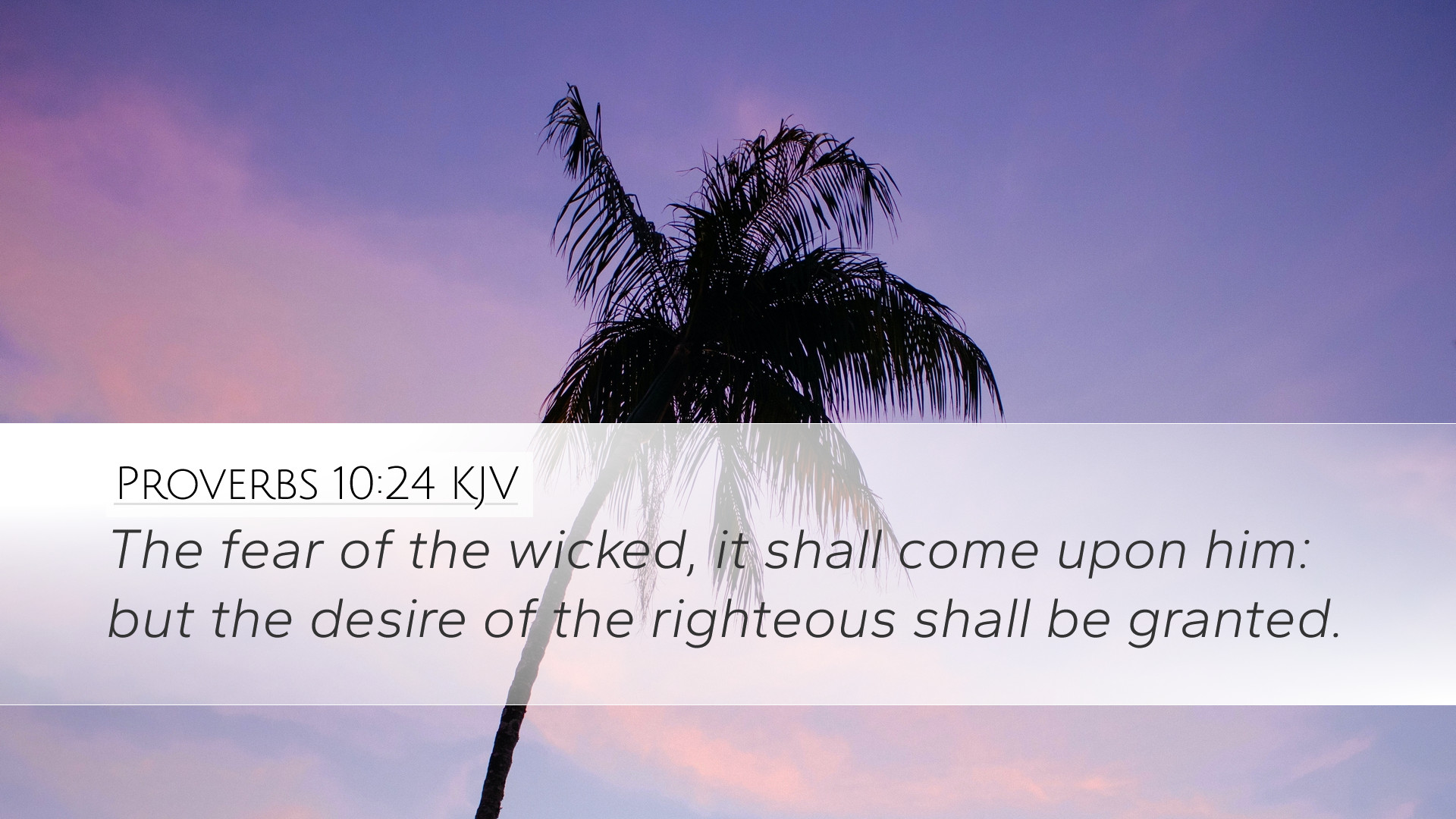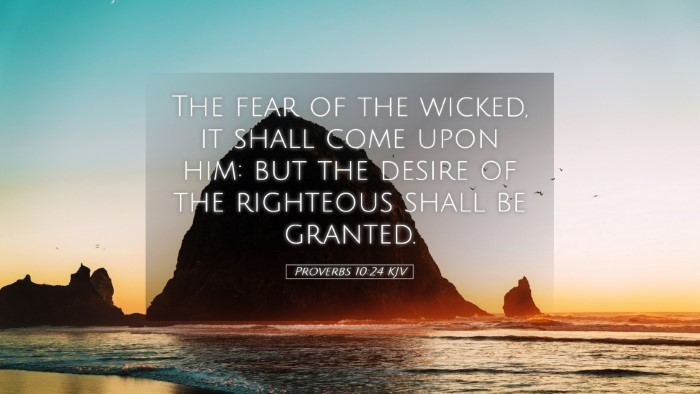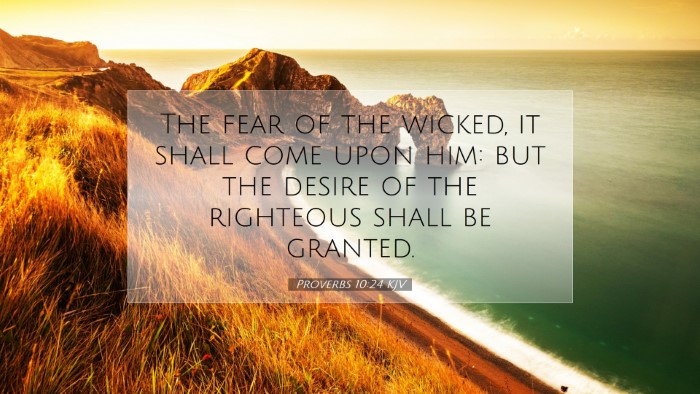Proverbs 10:24 Commentary
Verse: "The fear of the wicked, it shall come upon him: but the desire of the righteous shall be granted."
This verse from Proverbs serves as a profound reflection on the contrasting destinies of the wicked and the righteous. It encapsulates the biblical idea that one's actions and moral standing ultimately shape one's experiences in life and the afterlife. Below is an examination of this verse, drawing insights from cherished public domain commentaries.
Thematic Overview
At the heart of Proverbs 10:24 lies the principle of retribution—there is a certain inevitability that the wicked will face the consequences of their actions, while the righteous will be rewarded for their purity of heart and moral integrity. This duality is a common motif throughout the Book of Proverbs, emphasizing that human behavior is subject to divine justice.
Insights from Commentators
Matthew Henry's Commentary
Matthew Henry emphasizes the emotional turmoil that accompanies the lives of the wicked. He notes that "the fear of the wicked" speaks to the anxiety and dread they experience, often manifesting their inner guilt and foreboding. Their fear is not merely temporal; they are tormented by the prospect of their deeds catching up with them. Henry observes,
"The wicked cannot but be afraid of the judgments of God... their consciences are an evil that comes upon them."
In contrast, he highlights that "the desire of the righteous shall be granted," noting that the righteousness of individuals leads them to seek what is good and wholesome. The desires of the righteous align with God's will, thus enabling them to witness the fulfillment of such desires, which are ultimately rooted in divine favor.
Albert Barnes' Notes
Albert Barnes provides an analytical perspective, discussing the implications of fear in the life of the wicked. He points out how this fear can be a self-fulfilling prophecy, suggesting that their apprehensions often lead to destructive outcomes. He states,
"Their fears will drive them into actions that lead to more fear and despair."
This cycle reinforces the notion that a life devoid of righteousness is filled with anxiety and instability.
Barnes also contrasts this with the assurances given to the righteous, crafting a hopeful vision for the faithful who live a life in accordance with God’s precepts. He explains that the righteous, through their trust in God, will find their genuine desires met, as God’s providence rewards their faithfulness. Barnes encourages those who strive for righteousness by reminding them that their aspirations are within reach of God's grace.
Adam Clarke's Commentary
Adam Clarke brings a rich, historical context to this verse, examining the societal attitudes towards the wicked and the righteous. He posits that the wicked fear the consequences of their actions, which leads to a life lived in shadows, devoid of peace. Clarke articulates,
"This fear is not merely of temporal calamity, but of eternal separation from God."
He elaborates on the idea that the wicked, by default, distance themselves from divine grace, creating a chasm filled with dread.
In his discussion of the desires of the righteous, Clarke speaks of fulfillment that transcends worldly aspirations. He notes that "the desire of the righteous" encompasses a holistic vision encompassing spiritual, emotional, and material well-being, reinforcing the promise that God is responsive to the hearts and intentions of His faithful servants. Clarke's insights culminate in a call to embrace righteousness as a path leading to true fulfillment and peace.
Applications for Pastors and Scholars
This verse invites deep contemplation and provides practical applications for pastors, theologians, and students alike. It reinforces the essential truth that a life of righteousness is not only spiritually rewarding but also conducive to peace and assurance. The contrasting destinies of the wicked and the righteous serve as a reminder that God upholds justice. Here are some applications:
- Encouragement for the Righteous: Pastors can use this verse to encourage congregants who are striving to live a godly life, reminding them that their efforts are not in vain and that God honors sincerity and integrity.
- Warning Against Wickedness: There is a sobering call to introspection for all who wander into wickedness; this verse provides a stark reminder of the consequences of a life steeped in sin.
- Teach on Divine Justice: This verse can be a focal point for discussions on the nature of God’s justice and how it operates in both the present life and the life to come.
- Fostering Righteous Desires: Encourage believers to refine their desires in prayer, aligning them with God’s will so that they might experience the fulfillment promised in this verse.
Conclusion
Proverbs 10:24 serves as a poignant reminder of the fundamental biblical truths regarding the nature of fear and desire among the people of God. Through the insights of Matthew Henry, Albert Barnes, and Adam Clarke, we find a rich tapestry of understanding that allows us to grasp the implications of righteousness and wickedness. For the faithful, this verse encapsulates hope, assurance, and the promise of God's response to a life lived in accordance with His will. As we delve deeper into the wisdom of Proverbs, may we strive to live righteously, casting aside fear and embracing the desires that align with God’s eternal purpose.


